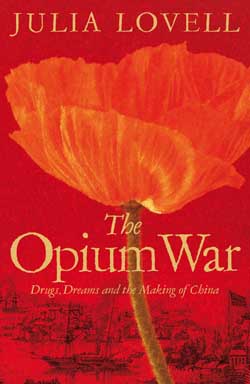Posted on March 20, 2013 by The Orwell Prize -

In 1986, Kris Maharaj, a British businessman living in Miami, was arrested for the brutal murder of two ex-business associates. His lawyer did not present a strong alibi; Kris was found guilty and sentenced to death in the electric chair.
It wasn’t until a young lawyer working for nothing, Clive Stafford Smith, took on his case that strong evidence began to emerge that the state of Florida had got the wrong man on Death Row. So far, so good – except that, as Stafford Smith argues here so compellingly, the American justice system is actually designed to ignore innocence. Twenty-six years later, Maharaj is still in jail.
Step by step, Stafford Smith untangles the Maharaj case and the system that makes disasters like this inevitable. His conclusions will act as a wake-up call for those who condone legislation which threatens basic human rights and, at the same time, the personal story he tells demonstrates that determination can challenge the institutions that surreptitiously threaten our freedom. Taken from Random House
Posted on March 20, 2013 by The Orwell Prize -

Tom Bergin is a Reuters journalist who writes about corporate and economic affairs. He is also the author of ‘Spills & Spin: The Inside Story of BP’, a critically-acclaimed history of the British oil major. In March 2013, he was named “Business Journalist of the Year” at the British Press Awards and has also won a Society of American Business Editors and Writers award for explanatory reporting. Tom is a regular contributor on television and radio in the UK and overseas.
Submitted articles
Posted on March 20, 2013 by The Orwell Prize -

At fourteen, Richard Holloway left his home in the Vale of Leven, north of Glasgow, and travelled hundreds of miles to be educated and trained for the priesthood by a religious order in an English monastery. By twenty-five he had been ordained and was working in the slums of Glasgow. Throughout the following forty years, Richard touched the lives of many people in the Church and in the wider community. But behind his confident public face lay a restless, unquiet heart and a constantly searching mind. Why is the Church, which claims to be the instrument of God’s love, so prone to cruelty and condemnation? And how can a man live with the tension between public faith and private doubt? In his long-awaited memoir, Richard seeks to answer these questions and to explain how, after many crises of faith, he finally and painfully left the Church. It is a wise, poetic and fiercely honest book. Taken from Canongate
Posted on February 28, 2012 by The Orwell Prize -

Everything you read in here is true. In Manchester, Anders Svensson is on the trail of drug baron Merlin and his lieutenant Flow, a man so dangerous his type is said to appear only once in a decade. In Glasgow, faced with the highest murder rate in Europe, Karyn McCluskey is a one-woman mission to end gang warfare. In London, Pilgrim finds he’s no longer feared. Troll, the child soldier, is terrorizing the streets. This is our hidden urban underworld. Untold, until now.
Posted on February 28, 2012 by The Orwell Prize -

David James Smith writes for the Sunday Times Magazine for whom he has travelled around the world writing cover stories, investigative articles, reportage and profiles. He has also published a number of books, including ‘The Sleep of Reason’ (his definitive account of the James Bulger case), ‘One Morning in Sarajevo; and ‘Young Mandela’. Taken from David James Smith’s website Submitted articles Remember the fallen (£) The secret life of a killer (£) The secret torments of Galliano (£) ‘A marriage breaker? That just isn’t the Claudia I know’ (£) Watching the detectives (£) Other links David James Smith on Twitter
Posted on February 28, 2012 by The Orwell Prize -

Lucie Blackman – tall, blonde, and twenty-one years old – stepped out into the vastness of Tokyo in the summer of 2000, and disappeared forever. The following winter, her dismembered remains were found buried in a seaside cave. The seven months in between had seen a massive search for the missing girl, involving Japanese policemen, British private detectives, Australian dowsers and Lucie’s desperate, but bitterly divided, parents. As the case unfolded, it drew the attention of prime ministers and sado-masochists, ambassadors and con-men, and reporters from across the world. Had Lucie been abducted by a religious cult, or snatched by human traffickers? Who was the mysterious man she had gone to meet? And what did her work, as a ‘hostess’ in the notorious Roppongi district of Tokyo, really involve? Richard Lloyd Parry, an award-winning foreign correspondent, has followed the case since Lucie’s disappearance. Over the course of a decade, he has travelled to four continents to interview those caught up in the story, fought off a legal attack in the Japanese courts, and worked undercover as a barman in a Roppongi strip club. He has talked exhaustively to Lucie’s friends and family and won unique access to the Japanese detectives who investigated the case. And he has delved into the mind and background of the man accused of the crime – Joji Obara, described by the judge as ‘unprecedented and extremely evil’. With the finesse of a novelist, he reveals the astonishing truth about Lucie and her fate.People Who Eat Darkness is, by turns, a non-fiction thriller, a courtroom drama and the biography of both a victim and a killer. It is the story of a young woman who fell prey to unspeakabale evil, and of a loving family torn apart by grief. And it is a fascinating insight into one of the world’s most baffling and mysterious societies, a light shone into dark corners of Japan that the rest of the world has never glimpsed before. Taken from Random House Group
Posted on February 28, 2012 by The Orwell Prize -

Amelia Gentleman writes on social affairs for The Guardian. Previously she was New Delhi correspondent for the International Herald Tribune. Formerly Paris and Moscow correspondent for The Guardian. Taken from The Guardian
Judges of the 2012 Journalism Prize, Brian Cathcart and Ian Hargreaves said:
An early reader of Down and Out in Paris and London praised George Orwell’s “true picture of conditions which most people ignore and ought not to be allowed to ignore”. The 2012 Orwell prize winner for journalism paints just such pictures for our times. Amelia Gentleman’s beautifully crafted examinations of hardship, welfare and justice for the Guardian bring us almost painfully close to subjects that are too often ignored, and they do so with cool, sharp powers of observation.
Submitted articles
Other links
Posted on February 28, 2012 by The Orwell Prize -

This is the gripping story of the men of the Welsh Guards and their bloody battle for survival in Afghanistan in 2009. Underequipped and overstretched, they found themselves in the most intense fighting the British had experienced in a generation. They were led into battle by Lieutenant Colonel Rupert Thorneloe, a passionate believer in the justness of the war who was deeply dismayed by the way it was being resourced and conducted. Thorneloe was killed by an IED during Operation Panther’s Claw, the biggest operation mounted by the British in Helmand.
Dead Men Risen draws on secret documents written by Thorneloe, which raise questions from beyond the grave that will unnerve politicians and generals alike. The Welsh Guards also lost Major Sean Birchall, commanding officer of IX Company, and Lieutenant Mark Evison, a platoon commander whose candid personal diary was unnervingly prophetic. Not since the Korean War had a single British battalion lost officers at the three key levels of leadership.
Harnden transports the reader into the heart of a conflict in which a soldier has to be prepared to kill and die, to ward off paralysing fear and watch comrades perish in agony. Given unprecedented access to the Welsh Guards, Harnden conducted hundreds of interviews in Afghanistan, England and Wales. He weaves the experiences of the guardsmen and the loved ones they left behind into a seamless and unsparing narrative that sits alongside a piercing analysis of the political and military strategy. No other book about modern warfare succeeds on so many levels.
Taken from Quercus
Judges of the 2012 Book Prize, Helena Kennedy, Miranda Carter and Sameer Rahim, said; ‘It sometimes seems that we only care about the soldiers fighting in our names when they are killed. Once the platitudes are over we forget about them. Toby Harnden’s remarkable book takes us into the hearts and minds of the Welsh Guards in a way that is both compelling and visceral. It challenges every citizen of this country to examine exactly what we’re asking soldiers to do in Afghanistan. And rather than offering easy answers it lets the soldiers speak for themselves.’
Posted on February 28, 2012 by The Orwell Prize -

‘On the outside, [the foreigners] seem intractable, but inside they are cowardly. . . Although there have been a few ups-and-downs, the situation as a whole is under control.’ In October 1839, a few months after the Chinese Imperial Commissioner, Lin Zexu, dispatched these confident words to his emperor, a cabinet meeting in Windsor voted to fight Britain’s first Opium War (1839-42) with China. The conflict turned out to be rich in tragicomedy: in bureaucratic fumblings, military missteps, political opportunism and collaboration. Yet over the past 170 years, this strange tale of misunderstanding, incompetence and compromise has become the founding myth of modern Chinese nationalism: the start of China’s heroic struggle against a Western conspiracy to destroy the country with opium and gunboat diplomacy. Beginning with the dramas of the war itself, Julia Lovell explores its causes and consequences and, through this larger narrative, interweaves the curious stories of opium’s promoters and attackers.The Opium War is both the story of modern China – starting from this first conflict with the West – and an analysis of the country’s contemporary self-image. It explores how China’s national myths mould its interactions with the outside world, how public memory is spun to serve the present; and how delusion and prejudice have bedevilled its relationship with the modern West. Taken from Pan Macmillan
Posted on February 28, 2012 by The Orwell Prize -
Posted on February 28, 2012 by The Orwell Prize -

Edward Docx writes for The Times, The Telegraph, The Washington Post, The Observer, Vogue and The Independent. His most recent journalism appears in The Guardian and Prospect Magazine. He has also published a number of books including The Calligrapher and Pravda. He is based in London. Taken from Edward Docx’ website Submitted articles Postmodernism is dead The prophet Flash fish The last stand of the Amazon Other links Edward Docx on Journalisted Edward Docx on Twitter
Posted on February 28, 2012 by The Orwell Prize -

I am a poet, critic, conversationalist, personal shopper, siren, and housemaid to the gods – at least they think they’re gods. So it said when this blog first opened in 2006. The little gods have grown up and are – as used to be said – beginning the world; the guinea pig died long ago, and I’m frankly too tired to be much of a siren; and yet Baroque in Hackney has a life of its own. Taken from Baroque in Hackney
Submitted links
Posted on February 28, 2012 by The Orwell Prize -

London-based journalist writing features and news for print and web. Recently completed a Winston Churchill Travel Fellowship reporting on immigration and asylum in Greece, Italy, Spain, France and the UK. Prior to that worked for the Washington Post’s London bureau chief as editorial assistant/special correspondent. Cut my teeth as news editor for the Partnerships Bulletin, a trade magazine all about PFIs and project finance. Before this, won a Guardian Scott Trust bursary to study print journalism at Sheffield University. Taken from Rebecca Omonira-Oyekanmi
Submitted posts
Posted on February 28, 2012 by The Orwell Prize -

Bringing you the story that Scottish journalists seem unable to do. Taken from Rangers Tax-Case
Submitted posts
- What is Rangers’ tax case all about? – Rangers Tax Case, 28/03/11
- Lies, damned lies, and Scottish football journalism – Rangers Tax Case, 29/03/11
- The Other Rangers Tax Case – Rangers Tax Case, 01/04/11
- Alastair Johnston Confirms The RangersTaxCase Truth – Rangers Tax Case, 02/04/11
- Rangers’ Expert Advice – Rangers Tax Case, 04/04/11
- Rangers Knew About Other Tax Bill – Rangers Tax Case, 06/04/11
- Making sense of nonsense – Rangers Tax Case, 26/04/11
- The deceptive Craig Whyte – Rangers Tax Case, 25/05/11
- Credit Where Credit Is Due – Rangers Tax Case, 14/08/11
- Martin Bain, His lawyers, Rangers & Insolvency – Rangers Tax Case, 10/09/11
Posted on February 28, 2012 by The Orwell Prize -

A girl. Noisy, sweary, political, very ranty. Geek mixed with a touch of law. No-longer-practising barrister. Taken from Twitter profile
Submitted posts
Posted on February 28, 2012 by The Orwell Prize -

From leadership seminars in fancy hotels to medieval figures walking from town to town looking for work in small town factories; from the naïve waitresses working in the mecca of five star hotels to farmers struggling to grow the right crops for the 21st century, Siddhartha Deb’s book is the riveting, moving, darkly comic, brilliantly told story of modern India. With the novelist’s vision, reminiscent of V.S. Naipaul’s An Area of Darkness, combined with the modern narrative force of Maximum City, Deb’s account paints a portrait of this country in turmoil through the story of its people: aspiring and deluded, desperate and hopeful, beautiful and damned. Taken from Penguin Books
Posted on February 28, 2012 by The Orwell Prize -

















